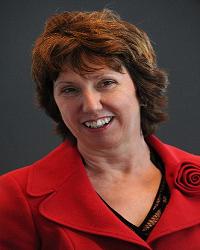The European Union’s High Representative for Foreign Affairs and Security Policy, Catherine Ashton, underscored on Monday, October 15th, 2012, that the EU shares Russia’s vision to solve the crisis in Syria peacefully! Good! What then? Would EU members, especially France, Britain and Germany, end their support to the ongoing violence in Syria, mainly caused by their ”non-lethal” s? Or would they lift their unjust, arbitrary and inhumane sanctions, the last of which were yesterday, imposed on the Syrians?! One can’t to but to be caught in a dilemma, Mrs. Ashton! What do you want from us?
In the same statement of yesterday, Ashton added that we reviewed with Lavrov the latest developments in Syria and stressed the need to seek a peaceful solution and support the mission of UN Envoy Lakhdar Ibrahimi, asserting that the EU comprehends Russia’s concern, particularly concerning the deterioration of relations between Turkey and Syria, stressing the necessity to stop violence inside Syria and not to allow this violence to spread. In fact, Ashton herself stated following the June 30th held Geneva meeting that the agreement reached then offered ”concrete points for action” and expressed hope that it would ”help bring about an end to violence and launch a political process in Syria and led by Syrians.” A clarification is needed here, what does Ashton mean by Syrians? We are Syrians, and the majority by all calculations. The majority is united with its army, and leadership in defending Syria against every form of foreign-backed armed terrorist groups.
On June 30th, 2012, the Foreign Ministers of the five UN Permanent Security Council members; Russia, USA, China, Britain and France in addition to Iraq, Kuwait, Turkey and Qatar, the UN Secretary General and Ashton herself participated in the convened Action Group meeting in Geneva. The participants concluded an agreement- though some of the points were in need for more clarifications-; it can be considered a basic one as to put an end to the crisis in Syria.
Geneva meeting statement was welcomed by almost every country worldwide, apart from the hypocrite politicians who did welcome, but left no stone unturned as to misinterpret and abort it.
The veteran Foreign Minister of Russia, Sergei Lavrov, whose great country has played the fundamental role in the wording of the statement, pointed out that Geneva statement imposed nothing on the Syrian people, placed no preconditions on the political process or national dialogue, affirmed the basic principles of democratic countries, including respect for human rights and the rights of ethnic and religious minorities, and stressed the need for free and democratic elections as to achieve a peaceful solution that takes the interests of all Syrians into consideration.
Minister Lavrov, more frank, transparent and courageous than his other counterparts in the meeting- some of whom openly declared their ill-intentions against Syria, particularly those of France, the USA, Qatar and Turkey- blasted the armed groups operating in Syria and the countries sponsoring them as to spread violence, and carry out attacks against administrative facilities, government and private properties.
Syria, on her part, did welcome Geneva meeting statement: an official source at the Syrian Foreign and Expatriates Ministry pointed out that the statement urged for an end to violence and human rights violations, disarming the armed groups, non-militarization of the situation in Syria, protection of civilians and launching a Syrian-led political process and national dialogue. Actually, by then and long before Geneva meting, Syria has launched scores of dialogue sessions and cabinet reshuffles. For Syria, according to the Foreign and Expatriates Ministry source, Geneva statement includes positive points, particularly its commitment to Syria’s sovereignty, independence, territorial integrity, not to mention its recognition that the Syrian People were the sole decision-makers in determining their future without foreign interference. However, and as facts on the ground prove, the crisis in Syria is but the result of overt and covert, lethal and non-lethal, if to say, foreign interference.
On his part, Chinese Foreign Minister, Yang Jiechi, underlined that the participants in Geneva meeting did reiterate their respect for the independence, sovereignty, unity and territorial integrity of Syria, and the need for a political transition to be led by the Syrian people, pointing out that the mentioning of the “transitional governing body” was designed to provide constructive assistance to a political transition process led by the Syrian People- of course NOT by Turkey, whose Foreign minister, has lost his mind, nor by Qatar, Saudi Arabia, France, or the USA.
Dr. Mohammad Abdo Al-Ibrahim

